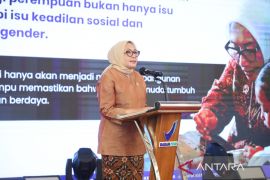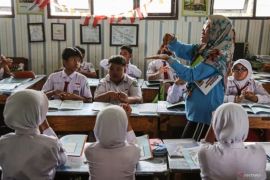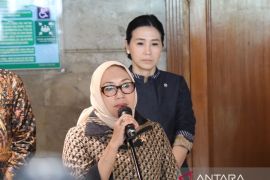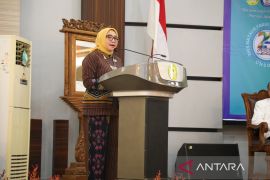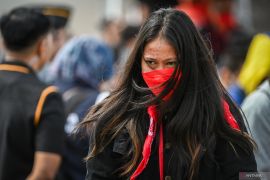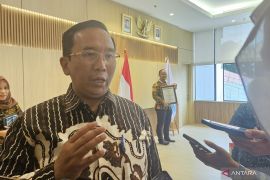The expressions of gratitude and appreciation toward the DPR move show that Indonesians have awaited this law.
The bill finally saw the light of day after over a decade-long struggle that began in 2012.
For sexual violence activists, the law is the result of hard work. The concern and doubt over the government's commitment that once plagued the public has now been allayed.
The contents of the Sexual Violence Prevention Law (UU TPKS) comprehensively cover victims' rights.
The law dictates procedural rights for handling sexual violence cases, protection rights that guarantee that law enforcement authorities do not degrade or blame victims, and recovery rights.
Restitution, compensation, and a Victim Trust Fund have also been stipulated by the government within the law to ensure the recovery of victims.
Moreover, the Sexual Violence Prevention Law has an important role as a legal umbrella that covers the entire dimension of sexual violence in Indonesia.
This differentiates it from previous regulations, which stipulate the types of sexual violence separately and in specific contexts.
For instance, laws such as the Domestic Violence Elimination Law (PKDRT), Human Trafficking Eradication Law (PTTPO), and Pornography Law dictate sexual violence within specific cases.
To this end, the Sexual Violence Prevention Law can become a legal umbrella for every type of sexual violence that occurs within society.
The law can play a crucial role in strengthening regulations on the state's responsibility for preventing and handling sexual violence cases, as well as ensuring effective recovery of victims.
However, the law’s passage does not mean that sexual violence will just disappear from Indonesia. There is still a lot of work that needs to be done to ensure effective UU TPKS implementation.
The ratification of the Sexual Violence Prevention Law is the starting point, not the finish line in the fight against sexual violence.
Related news: Parliament ratifies sexual violence prevention bill into law
Regulation bolstering and harmonization
Institute for Criminal Justice Reform (ICJR) researcher Maidina Rahmawati provided a number of suggestions to support the implementation of the Sexual Violence Prevention Law, specifically concerning the legal aspects.
The first one relates to the guarantee for strengthening the rape formulation within the Criminal Code Draft (RKUHP).
The Sexual Violence Prevention Law describes rape as another form of sexual violence that already exists or is stipulated in another law, as mentioned in Article 4 Point (2).
Rahmawati stressed that the strengthening of RKUHP formulation must be done immediately, with the guarantee that RKUHP establishment handles the problems that exist in the formulation of rape within the current Criminal Code.
It must stipulate on neutrality toward gender, elements of coercion that encompass power relations or mental violence, not limit rape to penis-vagina penetration, and not limit the occurrence of rape to outside of marriage.
Moreover, she also asked RKUHP drafters to stress that rape is a form of sexual violence so that victims’ rights that have been stipulated within UU TPKS can also be applied to rape victims.
In addition, she also urged the government to provide a guarantee for the synchronization of the Sexual Violation Prevention Law and the revised Electronic Information and Transaction Law (ITE).
Progressively, the government and DPR have included Electronic-Based Sexual Violence (KSBE) within Article 14 of the Sexual Violence Prevention Law.
This will forbid the recording, transmitting, and stalking of other people or their personal contents without their consent.
To this end, consent must become the foundation of regulation on personal content distribution.
When someone distributes any content without the consent of the content owner, then the owner must be declared as the victim, not the perpetrator.
With this condition, Article 27 point (1) of ITE Law, which is oriented toward content and not the content owners' approval, must be eliminated within the ITE Law revision.
Meanwhile, the ban on the distribution of indecent content has already been covered within the Pornography Law. Hence, there is no benefit in keeping Article 27 Point (1) of the ITE Law.
Concerning evidence that had become one of the hurdles for victims in using the legal process, Rahmawati stressed that there must be synchronization with the RKUHP.
She urged the government to dictate a preliminary examination judge to evaluate the eligibility of evidence in criminal cases.
The legal system within a nation must have a preliminary examination judge to test the relevance of evidence in order to allow them in a case.
Meanwhile, the RKUHP still has not dictated the concept of a preliminary examination judge. This has become a basic requirement so that the government can immediately discuss the Criminal Code Procedure revision.
Rahmawati said that she was concerned that if this is not dictated, someone can be easily implicated with minimal evidence.
Regulation strengthening and harmonization must be undertaken by the government and DPR to ensure the success of the Sexual Violence Prevention Law's implementation.
However, preventing sexual violence and executing the legal process to ensure the rights of sexual violence victims cannot be done through written regulation alone.
The people and law enforcement authorities as the executors on the field will also play a crucial role.
Related news: UU TPKS shows govt's commitment to protecting women: academician
Public education
People's Consultative Assembly (MPR) Deputy Speaker Lestari Moerdijat also highlighted that the understanding of the law enforcement authorities and the general public will be key to the effective implementation of UU TPKS.
Based on various sexual violence cases in Indonesia, it is important for people to understand the type of sexual violence that they may have experienced.
Moreover, they must also understand the legal process to ensure protection rights for victims and the procedure to obtain access toward recovery.
Public understanding is important to ensure that the Sexual Violence Prevention Law is implemented properly because the law is directly connected with the interest of the general public.
Law enforcement authorities must also receive education on the procedure for handling reports or cases involving sexual violence victims.
In addition, the Sexual Violence Prevention Law stipulates the protection rights that guarantee that law enforcement authorities will not degrade or blame victims.
Hence, education on behaviors that do not degrade or blame victims is one of the crucial aspects to ensure the success of the legal process that sexual violence victims must go through.
Public education can be provided through dissemination, especially in various institutions where sexual violence tends to occur due to power relations.
The public must understand how the law works so its effect in preventing sexual violence and guaranteeing victims' rights can be felt immediately.
To this end, the joy over the ratification of the Sexual Violence Prevention Law cannot weaken the struggle to eliminate sexual violence in Indonesia.
There are still various works to be done in order to maximize the implementation of this law.
Related news: House Speaker calls for derivative regulations of sexual violence law
Related news: UU TPKS shows govt's commitment to protecting women: academician
Editor: Suharto
Copyright © ANTARA 2022

